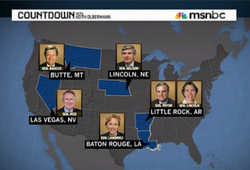Free health clinics planned for states with reform-adverse Senators
 An effort is underway to organize a large free health clinic in Arkansas or Louisiana to draw attention to the need for change in states with Democratic senators key to passing health reform legislation.
An effort is underway to organize a large free health clinic in Arkansas or Louisiana to draw attention to the need for change in states with Democratic senators key to passing health reform legislation.The idea was first proposed by MSNBC News anchor Keith Olbermann of "Countdown With Keith Olbermann" in his hour-long special comment last week calling for health reform. The comment, which is set to be re-broadcast this Friday, was inspired by Olbermann's experience caring for his ailing father, who is currently hospitalized. Said Olbermann:
I propose tonight one act with two purposes. I propose that we embrace the selfless individuals at the National Association of Free Clinics. You know them -- they conducted the mass health care free clinic in Houston that served 1,500 people. I want a health care free clinic every week in the principle cities of the states of the six senators key to defeating a filibuster against health care reform in the Senate.On his show yesterday, Olbermann reported that more than 10,500 people have responded to his call so far, donating more than $817,000 to the Virginia-based nonprofit National Association of Free Clinics. That amount includes a $50,000 gift from Olbermann himself.
I want Sens. Lincoln and Pryor to see what health care and poverty is really like in Little Rock. I want Sen. Baucus to see it in Butte. I want Sen. Ben Nelson to see it in Lincoln. I want Sen. Landrieu to see in in Baton Rouge. I want Sen. Reid to see it in Las Vegas.
I'll donate. How much will you donate?
NAFC Executive Director Nicole Lamoureux told the Connecticut newspaper The Day that she is hoping to use the funds to hold a one-day clinic in either Arkansas or Louisiana within the next six weeks.
Both of those states have large populations of people who are uninsured. In the period 2007-2008, 19.2% of non-elderly residents of Arkansas and 21.9% of the non-elderly residents of Louisiana did not have health insurance, according to the Kaiser Family Foundation's StateHealthFacts.org. That compares to 17.4% of the non-elderly nationwide.
At the same time, Arkansas and Louisiana also have Senators who have proven unwilling to support health reform that includes a public insurance option, seen as key to expanding coverage while holding down skyrocketing insurance costs.
Sen. Blanche Lincoln (D-Ark.) voted against public option amendments in the Senate Finance Committee, and her colleague Sen. Mark Pryor (D-Ark.) has also been reluctant to support the public option -- even though a recent poll found that a 55% majority of Arkansas voters favor it, along with 65% of Americans nationwide.
Sen. Mary Landrieu (D-La.) has also stated her opposition to a public option, telling a local Chamber of Commerce that she prefers "a private market-based approach to any health care reform." Sen. David Vitter (R-La.) opposes a public option as well.
Landrieu was recently the target of an ad campaign sponsored by a coalition of civil rights groups for her refusal to support a public option. The coalition -- which includes the NAACP, National Council of La Raza, the Leadership Conference on Civil Rights and the Campaign for Community Change -- says a public option is key to providing accessible and affordable health care to minorities, who suffer disproportionately from high rates of disease.
NAFC is hoping for a further fundraising boost from its scheduled appearance on today's Dr. Oz Show, featuring cardiac surgeon Dr. Mehmet Oz. The hour-long special will show footage from the recent free clinic in Houston that drew more than 1,500 people.
In the meantime, Congressional leaders continue to work on health reform legislation. On Tuesday, the Senate Finance Committee passed a reform bill sponsored by Sen. Max Baucus (D-Mont.) that did not include a public option. That legislation must now be melded with reform bills passed by other Senate committees and then approved by the full Senate before being reconciled with reform legislation passed by the House of Representatives. Advocates of the public health insurance option are hoping to get it added back in during the long process ahead.
One of the key arguments made in favor of the public option is that it would provide competition to private insurers, who in many places around the country operate as near-monopolies. As Facing South has reported, many of the Senate Democrats on the Finance Committee who voted against the public option come from states with highly concentrated health insurance industries.
In Sen. Lincoln's state of Arkansas, for example, 75% of the health insurance market is controlled by Blue Cross Blue Shield, while in Sen. Landrieu's Louisiana Blue Cross Blue Shield controls 61% of the commercial market, according to a recent report from Health Care for America Now.
In another effort to bring greater competition to the health insurance industry, leading Democrats are pushing for an amendment to the health reform bill that would end the long-standing antitrust exemption for insurers. Created by the McCarran-Ferguson Act of 1945, the exemption now cedes regulatory control of the industry to individual states.
Tags
Sue Sturgis
Sue is the former editorial director of Facing South and the Institute for Southern Studies.
